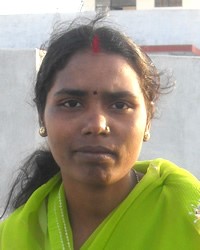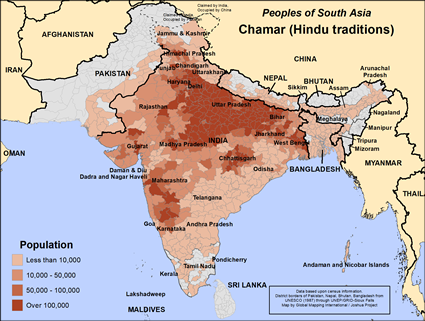The Chamar people are also known as Bhambi, Asadaru, Khalpa, Machigar, Lingayat, Mochi and Rohit. They live primarily in India's western states of Uttar Pradesh, Madhya Pradesh, and Bihar. Smaller numbers live in other countries of South Asia such as Pakistan and Bangladesh. A fairly large number live in Nepal where there is a Hindu majority.
They are considered to have very low status, and most of them know nothing else their entire lives. Because of their low status, they are considered unworthy of any sort of provision by Hindu society. This translates into frequent joblessness, lack of education and lifelong poverty. Traditional high-status members will even avoid their shadow.
Their main occupation is manufacturing shoes and chappals from finished leather. Besides this, they are engaged in daily-wage labor and petty business. Day labor and petty business are also main sources of income, along with the manufacture of shoes and chappal, an Indian sandal. The origins of the name "chamar" come from their leather work. Women are also involved in agricultural work, animal husbandry and various economic activities. The Bhambi Khalpa community repairs musical instruments like dhol and nagara which are played in the temples during worship.
Their staple grains are rice and jowar. The Chamar regard themselves higher than the Mangs and the Mahars.
The Chamar practice monogamy (one husband, one wife) in marriage. Dowry is largely prevalent and is paid in cash and kind. Remarriage is allowed for widowers but not for the widows. The dead body of a bachelor is buried lying on its back with the head facing the south, whereas others are cremated, and their mortal remains are immersed in sacred water. Rice balls are offered to the dead and to ancestors on the tenth day after death.
The Chamar are Hindu. They belong to the Shiva and Bhagvat sects. Their deities are Bahiroba, Janai, Kandova of Jejori and Bhawani of Tuljapur. They follow the spiritual teachings of Ravidas. They recite mythological tales and sing songs from the religious epics. They celebrate the festivals such as Diwali, Panchami, Ganesh Chaturthi, Kartik, Holi and Hannami.
There is a slightly higher degree of responsiveness to the gospel among the Chamars than among other low status groups. There is a church planting movement underway among Chamars in several districts across India.
The religious system is a key part of their identity, leaving no room in their hearts for Jesus Christ. They also have low self-esteem.
Pray for leaders in the Chadar community to find their sense of worth in the Lord of lords.
For the salvation of the Chamar people and that God may send several Christian workers among them to meet their spiritual and physical needs.
For the Chamar people to break through the caste barrier; be accepted and accept other communities.
Pray that these Chamar believers will be salt and light to Chamar communities throughout Nepal.
Pray that church planting will grow across all Chamar communities.
Pray for more workers to enter the Chamar harvest.
Scripture Prayers for the Chamar (Hindu traditions) in Nepal.
India Missions Association - Edited by Philipose Vaidyar Copyrighted © Used with permission
| Profile Source: Joshua Project |











